|| A WIP langblr to help me keep up with studying Finnish, German, French, and various other languages | follows from @fallsekings ||
Don't wanna be here? Send us removal request.
Text
How to build a language self-study plan

So I’ve noticed, upon combing through pages and pages of youtube videos and google blogs, that rarely does anyone ever actually tell you what you should be studying. There’s a reason for this ! Everyone is different and at a different level, different motivation. It’s impossible to create a study plan that is perfect for everyone… which is why it can also be agonizing to make one for yourself.
“How am I supposed to know what’s important to study, if I don’t speak the language?”
Well that’s a good question! You need to gauge how far you’ve come so far and how far you’d like to get. It’s easiest when you are starting from zero because you can learn the alphabet, numbers, basic phrases, and basic grammar. Easy peasy. You can go cover to cover in a text book.
Here’s a check-list to create the perfect study plan special to you.
1. What do I know already? What do I need to work on?
- is it worth starting a textbook, if you feel like you already know half of it? It might be worth completing the given exercises and if you achieve an 80% or higher (or you could give that lesson to someone else) then you can move on from that specific point.
- create a list of the points that you still need to master
2. What do I need to include in a study session?
- naturally there needs to be a focus or a few different focuses of a study session, whether it’s a specific activity or a grammar point. I recommend creating a list of things you want to get done (a.) every day, (b) every week, and © every month. These goals must be quantifiable. For example, every week I read two news articles in German. As a reflection, I then write a summary of the event of the article as well as a personal opinion. That’s an easy box to check.
- you need a reflection. It’s important to really take time to reflect on how you feel about the time spent and the materials used. What could you do better next time? What went well?
3. When is the best time to study?
- are you more active/focused in the morning or in the night? The key is consistency. If you have a routine, you’re far more likely to adhere to it. I know that my own schedule is highly changeable and that can make it very difficult, but I’ve found if I wake up in the same period of time every morning, brush my teeth, make my bed, and then sit down to my work, I feel far more productive.
- how much should I study at a time? The recommended period is 25 minutes from the Pomodoro Method with a five minute break. You can research time-management techniques but ultimately it comes down to you.
4. How do I take notes ?
- IT”S ALL ABOUT YOU! What I do is take messy notes in classes or on my own and then I transcribe the finished page to my Notion page. It gives me a chance to make the notes neater and also to review a little bit. I will say though statistically, you will remember better if you write by hand.
- I like to have a column on each page for words I didn’t know
2K notes
·
View notes
Text
9 points about language learning and how I’m learning 20+ of them
I’ve had a few requests to write about how I learn my languages. To different degrees, there’s currently 20+ of them and I don’t see myself stopping yet. The thing is, learning languages comes really easily to me and I want to share, maybe it will be helpful to somebody else.
First, I’d like to have a look at first versus second language acquisition. I’m a linguist and I’m super interested in Child Language Acquisition. That however, has a critical age of 14 (or so I was always told) and is then no longer possible and any language learned after that age will never progress as quickly or can’t be learned perfectly. Well. I disagree. The simple difference is - first language acquisition is how you acquired your first language(s) as a child. By imitating, finding patterns, etc. Second language acquisition is what you know from language courses. Vocabulary, irregular verb tables, endless exercises. Now that we got some of the terminology off the table, let me see how I actually learn languages: 1) I utilise elements of the first language acquisition rather than second language I’ve only studied vocab a couple times at school, when I put them into Quizlet or when someone forced me to. I’ll get back to it in another point. I don’t learn patterns. I know there is one and I let the input do its magic of slithering into my head. Again, more on that in point 2. You always get told you’ll learn a language better when you’re thrown into the country where they speak it. And it’s so true because of the processes behind it. Because input and immersion are the keys and that’s how children learn, too.
2) I don’t cram languages. I process them.
Around langblrs, I keep seeing all the ‘crying over verb tables’, ‘trying to learn a 1000 words this week’ and the like. That may work for you, sure. But I’ve never done that. I did learn a few irregular verb patterns for German in class, but while I could recite them, it wasn’t helpful. In Irish, I sometimes still wonder which verb ‘An ndeachaigh tú?’ comes from. The thing is, you’re able to process language. You know this word is probably irregular. If you come across it and don’t know what the irregular form is, look it up. After you’ve looked it up for the tenth time, you’ll probably remember by then. Same with anything else. Don’t try to learn things by heart when it comes to languages. 3) Vocab?? Same rule applies here. I’ve only learned vocab at school and then a handful of times when I wasn’t too lazy to put it into Quizlet (which is fun and I learn something, but it’s more of a useful pastime than anything). When you read, just skip the words you don’t know and only really look them up if you can’t tell by context. NEVER translate vocabulary. I mean, sure, look up what it means, but don’t connect it to the word itself. Connect it to the meaning. Pictures work better. As for abstract words, imagine the concept. Just try not to bridge the meaning of the word with your native language. Languages in your brain are meant to be two separate units. Unless you’re working on a translation piece, they shouldn’t be ‘touching’. 4) I use example sentences for everything.
Grammar guides are useful but rather than learning all the rules at once, take it one step at a time and remember some example sentences and let them guide you through the grammar rule you need.
5) Input is everything. Output is hard, but you’re basically imitating input and utilizing patterns you know (or think you know). Let me give you an example. Let’s say I’m writing a piece on my daily routine, for example. I make use of the example sentences and try to tailor them to my own needs. Trial and error, if I make a mistake, it’s okay, if somebody points it out, I probably won’t make it next time. As I progress, I will gradually remove the mistake. Same goes to new words and new verbs. Use the input you’ve got. Does this verb sound like some other verb you’ve heard before? It’s might have a similar conjugation pattern. You can check it, you don’t have to.
6) Learning languages should NOT be stressful! I never stressed over learning a language. Sure, I’m frustrated that after a year and a half of learning Irish, I’m not 100% fluent, but I’ve never stressed over it. I’ve never cried over it. I’ve never cried over a language (I only cried after a French oral exam which I thought I failed). Don’t be hard on yourself and try learning through a method that’s not stressful. Watch videos for children. Read books for children. Write down cool things in your target language(s). 7) You’ve learned a language before. Why wouldn’t you be able to learn it now in a very similar way? This is basically me saying that I have little belief in the efficiency of pure second language acquisition. Maybe a few individuals can reach fluency by cramming a language, the thing is, I think that if we concentrate on processing instead of remembering, just like we did when we were children, we can reach better results in a shorter amount of time. Also, if this is your third or fourth language, compare to languages you already know. 8) I don’t start with basics. I start ‘somewhere’.
Delve into the language the second you’ve started. Are you overwhelmed? That’s fine! You’ll find your way around it. Start with word meanings, finding out what kind of sentences those are and then build your way around it. Don’t start saying ‘hello’ and ‘I’m from’. Those are cool, but usually, they are used in a different way when you actually go out and speak. You’ll get them along the way.
9) Don’t rely on instructions (only). Rely on yourself.
This is just my two cents. I’ve pieced this together trying to remember how I’ve learned what I’ve learned and comparing it to how others around me learned. Please, let me know if it makes any sense. I may edit this and post this again later if I have any more ideas. Feel free to contribute or to bombard me with questions. I’m happy to answer.
10K notes
·
View notes
Photo

Countries with highest number of lakes.
by awesome.maps_
295 notes
·
View notes
Photo

The word for Earth in different European languages.
by @Mapologies_com
182 notes
·
View notes
Text
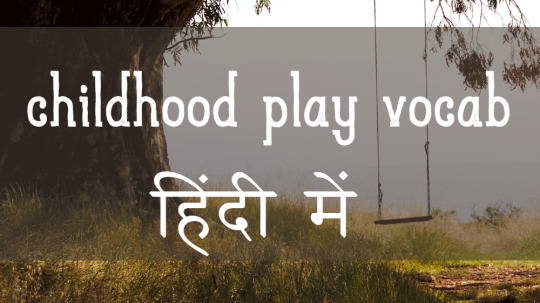
Childhood Play Vocabulary
खेलने की जगह - play area (feminine) खेल का मैदान - playground (masculine) बग़ीचा, पार्क - park (masculine) मनोरंजन पार्क - amusement park (masculine) अड़ोस-पड़ोस, मोहल्ला - neighborhood (masculine) आंगन - yard (masculine) बचपन - childhood (masculine) बाल विकास - child development (masculine) रचनात्मकता - creativity (feminine) कल्पना - imagination (feminine)
At the Playground
खेल के मैदान उपकरण - playground equipment (masculine) * this equipment can be रोमांचक (exciting), आकर्षक (interesting, attractive) and चुनौतीपूर्ण (challenging) for children. झूमा-झूमी - teeter-totter, seesaw (feminine) झूमना - to sway, rock, wave (intransitive) झूला - swing (masculine) झूलना - to swing (intransitive) चढ़ाई फ्रेम - climbing frame, jungle gym (masculine) स्लाइड - slide (masculine) * a slide can be सीधा (straight), लहरदार (wavy) or सर्पिल (spiral). * पानी की स्लाइड - water slide सीढ़ी - ladder (feminine) सीढ़ियाँ - stairs (feminine) स्लाइड के शीर्ष पर चढ़ना - to climb to the top of the slide (intransitive) ढलान - chute of a slide (feminine) ढलान को नीचे स्लाइड करना - to slide down the chute (feminine) स्लाइड पर खेलना - to play on a slide (transitive) खेलने का घर - play house (masculine) रेत, बालू - sand (feminine) रेत के खिलौने - sand toys (masculine) खोदना - to dig (transitive) बाल्टी - bucket (feminine) फ़ावड़ा - spade, shovel (masculine) रेत का महल - sand castle (masculine) रेत का महल बनाना / खड़ा करना - to make a sand castle (transitive) पतंग - kite (masculine) पतंग उड़ाना - to fly a kite (transitive) हिंडोला - carousel, marry-go-around (masculine)
Toys
खिलौना - toy (masculine) * toys are often made of लकड़ी (wood) or प्लास्टिक (plastic). गुड़िया - doll (feminine) गुड़िया का मकान - doll's house (masculine) खिलौना गाड़ी - toy car, also खिलौना कार (masculine) से / के साथ खेलना - to play with [toys, dolls, cars...] (transitive) आलीशान खिलौना - stuffed animal, plushie (masculine) फ़रफ़री - pinwheel (feminine) घूमना - to turn, rotate, go around (intransitive)
Games and Play
खेलना - to play (ambitransitive) खेल - game, play (masculine) * a game or play can be संवादात्मक (interactive), संरचित (structured) or सहज (spontaneous). * घर के अंदर खेले जाने वाला खेल - indoor game * बहिर्कक्ष खेल, मैदानी खेल - outdoor game खेलने का साथी - play mate (masculine) खेल-कूद - game, fun, sports (masculine) पहेली - riddle, puzzle (feminine) खेल के नियम - rules of the game (masculine) नियमों में बदलाव करना - to change the rules (transitive) खिलाड़ी - player (masculine) लुकाछिपी, छुआ-छुऔवल - hide and seek (feminine) खुद को छुपाना - to hide oneself (transitive), also छुपना (intransitive) खोजी, खोजनेवाला, ढूँढ़नेवाला - seeker (adjective) ढूंढ़ना, खोजना - to seek, find (transitive) अपनी आखें बंद करना - to close one's eyes (transitive) दस/तीस तक गिनना - to count to ten/thirty (transitive) तैयार हो या न हो, मैं आ रहा हूँ! - Ready or not, here I come! गेंद - ball (masculine) गोल - goal (masculine) लात मारना - to kick (transitive) दौड़ना, भागना - to run (intransitive)
Child-like Activities
मज़े / मस्ती करना - to have fun, play (transitive) मज़ेदार - fun (adjective) हँसना - to laugh (intransitive) हाथ में हाथ डालकर चलना - to go hand in hand (intransitive) बच्चों की कविता - nursery rhyme (feminine) गाना - to sing (transitive) ताली बजाना - to clap hands (transitive) घेरा, गोल, गोला - circle (masculine) गोल घेरे में खड़ा होना - to stand in a circle (intransitive) गोला बनाकर बैठना - to sit in a circle (intransitive) अपनी बारी का इंतजार करना - to wait one's turn (transitive) कूदना - to jump, hop (intransitive) रस्सी - rope (feminine) रस्सी कूदना - to jump rope (transitive) साइकिल - bicycle (feminine) साइकिल चलाना - to drive a bicycle (transitive) साइकिल की टोपी - helmet (feminine) हाथ छोड़कर साइकिल चलाना - to drive a bike without hands (transitive) साइकिल से गिर जाना - to fall off a bicycle (intransitive) अवलोकन करना - to observe (transitive) शरार�� - prank, mischief (feminine) धकेल देना - to push (transitive) ठोकर खाना - to stumble (transitive) गिरना - to fall (intransitive) लड़ना, झगड़ा करना - to quarrel, fight (transitive) रोना - to cry (intransitive) माफी माँगना - to apologize (transitive)
22 notes
·
View notes
Text
ヲタ恋☆単語⑬
More Chapter 3 vocabulary from ヲタクに恋は難しい!

JLPT N1/N2 Vocabulary - Ep 3/3.5
N2
当日 とうじつ the day of, that very day, appointed day
応援 おうえん cheering, rooting for, supporting
羨ましい うらやましい envious, jealous
高度 こうど high degree, high-speed
N1
超 ちょう super-, extremely
歓声 かんせい cheer, shout of joy
予想 よそう expectation, prediction, conjecture
果たす はたす to fulfill, accomplish, carry out
興奮 こうふん excitement, stimulation, arousal
清々しい すがすがしい refreshing (feeling, scene, wind, etc.), fresh, brisk
規模 きぼ scale, scope
96 notes
·
View notes
Text
book & literature vocab 📖
kirja - book sanakirja - dictionary kovakantinen kirja - hardcover book päiväkirja - diary kirjallisuus - literature pokkari - pocket book, paperback {coll.} nimeke - title kirjan nimi - book name painos - edition alkusanat - preface sivu - page kääntää sivua - to turn the page kirjakauppaa - bookshop antikvariaatti - antiquarian bookshop kirjailija - author kirjoittaa - to write lukea - to read julkaista - to publish julkaisu - publication dekkari - crime novel romaani - novel käännösromaani - translated novel jännitysromaani - thriller novel novelli - short story novellikokoelma - collection of short stories runo - poem runoilija - poet sarjakuva - comics matkaopas - travel guide uutuus -novelty ilmestyä - to be released kirjanmerkki - bookmark
93 notes
·
View notes
Text
Some language learning exercises and tips
These are some of the activities I do. Maybe you'll find them helpful:
Write a mock dating profile for yourself. Describe yourself, list your hobbies and interests, hopes for the future, likes and dislikes, and the qualities you're looking for in a partner. Enjoyed it? Write one for your favourite character/OC.
Try to find a Youtuber who plays your favourite game and does commentary in your target language. I watch this guy a lot.
Describe locations in your favourite books, games, movies, TV shows etc. I like to wander the Hitman maps and write about the different areas, NPCs, and situations I observe.
Write a mock interview with your character/influential figure of choice.
Choose a fairy tale and write your interpretation of it in your target language.
When you're cooking, say what you're doing out loud as if you were talking to a studio audience.
Imagine your mutuals are coming to your city for a visit. Write up a lil guidebook for them describing places of interest. Write an itinerary to practice using the future tense and "first", "then", "after that", etc statements.
A chalk marker might be useful to you. I write important words and phrases that I'm having trouble remembering on my bathroom mirror. I just wipe them away with a damp cloth later.
Review books, albums, movies etc in your target language. Either write down your review or record yourself talking about it.
1K notes
·
View notes
Photo

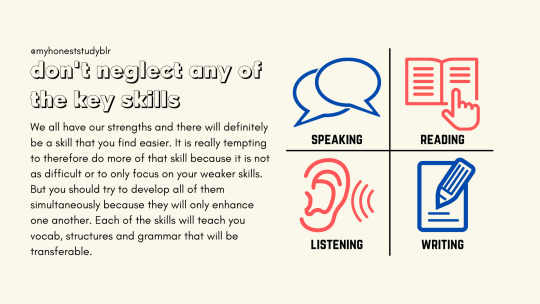
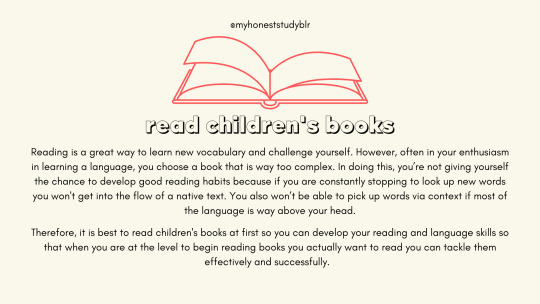


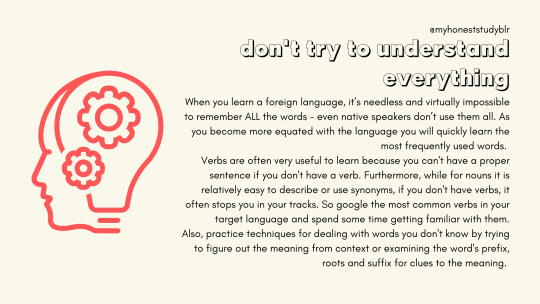
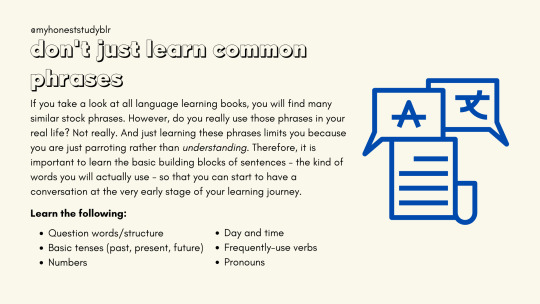
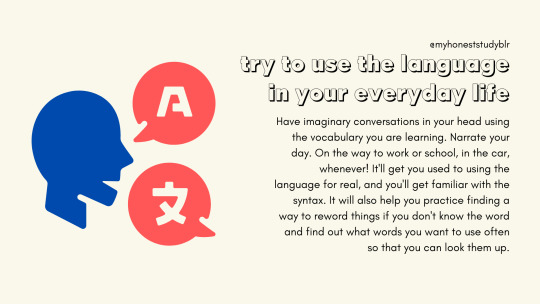


my masterpost | my studygram | ask me anything
[click images for high quality]
[transcript under the cut]
Other advice posts that may be of interest:
How To Study When You Really Don’t Want To
How To Do Uni Readings
Active Revision Tips
Keep reading
8K notes
·
View notes
Photo

Moon vocabulary in Finnish:
kuu - moon kuun vaiheet - lunar phase kuunsirppi - crescent (literally “moon’s sickle”) puolikuu - half moon täysikuu - full moon uusikuu - new moon alakuu - waning crescent/gibbous (last quarter) yläkuu - waxing crescent/gibbous (first quarter) vähenevä kuu - waning crescent/gibbous (last quarter) kasvava kuu - waxing crescent/gibbous (first quarter) kuunpimennys - lunar eclipse (lit. “moon’s darkening”) kuun etupuoli/lähipuoli - near side of the moon kuun kääntöpuoli - far/dark side of the moon (lit. “reverse side of the moon”) kuukausi - month (lit. “moon period”) kuunsilta - “moon’s bridge”, long reflection of the moon’s light on water kuunsäde - moonbeam kuunvalo - moon’s light kuunkehä - halo (for sun’s halo: auringonkehä) kuutamo - moonlight (e.g. talvinen kuutamo, wintery moonlight) kuutamoinen - lit by the moon (e.g. kuutamoinen metsä, forest lit by the moon) kuumaisema - landscape of the moon kuutamokävely - nightly walk in moonlight, especially by lovers kuutamouinti - moonlit swim kuutamourakointi - concept of tax avoidance in building work (i.e. paying workers in cash) kuutamourakka - building work where taxes are being avoided kuunaama(inen) - round face(d) kuuhulluus - lunar effect kuuhullu - person under the influence of the lunar effect kuutar - goddess of moon and gold kuu-ukko - personification of the moon “man in the moon” (lit. “old man moon”), elderly person, alien

Inspired by Photos 1, 2
25 notes
·
View notes
Text
Random German Vocabulary (80)
der Föhn – hairdryer der Rabauke – lout; rascal der Suchtrupp – search party der Vorrang – priority
persiflieren – to satirize schweifen – to wander sich suhlen – to wallow (jemanden) verschonen – to spare (someone)
haarsträubend – hair-raising tüchtig – capable unangefochten – unchallenged vorsichtshalber – as a precaution
(jemandem) auf den Leim gehen – to fall for somebody’s tricks Muffensausen haben – to be scared stiff schalten und walten – to do as one pleases (jemandem) die Worte im Mund umdrehen – to twist (someone’s) words
36 notes
·
View notes
Text
Best language learning tips & masterlists from other bloggers I’ve come across
(these posts are not my own!)
THE HOLY GRAIL of language learning (-> seriously tho, this is the BEST thing I’ve ever come across)
Tips:
Some language learning exercises and tips
20 Favorite Language Learning Tips
what should you be reading to maximize your language learning?
tips for learning a language (things i wish i knew before i started)
language learning and langblr tips
Tips on how to read in your target language for longer periods of time
Tips and inspiration from Fluent in 3 months by Benny Lewis
Tips for learning a sign language
Tips for relearning your second first language
How to:
how to self teach a new language
learning a language: how to
learning languages and how to make it fun
how to study languages
how to practice speaking in a foreign language
how to learn a language when you don’t know where to start
how to make a schedule for language learning
How to keep track of learning more than one language at the same time
Masterposts:
Language Study Master Post
Swedish Resources Masterpost
French Resouces Masterpost
Italian Resources Masterpost
Resource List for Learning German
Challenges:
Language-Sanctuary Langblr Challenge
language learning checkerboard challenge
Word lists:
2+ months of language learning prompts
list of words you need to know in your target language, in 3 levels
Other stuff:
bullet journal dedicated to language learning
over 400 language related youtube channels in 50+ languages
TED talks about language (learning)
Learning the Alien Languages of Star Trek
.
Feel free to reblog and add your own lists / masterlists!
17K notes
·
View notes
Text
A tiny list of german songs!!
for @anxietyfuelledadventure
Some are original, some r anime covers and other vocaloid covers! my emojis will refer to that haha
🌱 Je ne parle pas français —Namika cover by Selphius (my fav song on this list!)
🌸 Blumenkranz — Kill La Kill OST
🤖 Kletter! Weiter! Zu dem großen Turm — German Cover by Jinja
🌱 Wenn sie kommen — Namika
🤖 world.execute(me) — German cover by Jinja
🌸 Kono Yubi Tomare — German cover by Selphius (i love this one so much too omggg)
🌸 STYX HELIX — German cover by Selphius
🌱 Alles was zählt — Namika cover by Selphius
🤖 Wissen will ich's nicht — German cover by Jinja
🌸 Gurenge — German cover by Jinja (best version of Gurenge imo)
142 notes
·
View notes
Text
Learning a language = learning a culture
To truly understand a language and the people speaking that language, you also have to make a conscious effort to learn about the culture and history of these people. I know that the cultures of the countries where a language is spoken can be very different (e.g. Mexico vs. Spain, France vs. all African states where French is spoken, and even England vs. Ireland vs. Australia), so these suggestions work best if you have a specific target country in mind.
Here are some ideas on where to start:
look at the political system of your target country/culture: how does it work? Who are the most important people right now? Is there a monarchy?
look at the (broad) history of your target country/culture: since when is it an official country? Has it been in any wars? If so, with who and why? Was this country ever colonised or a coloniser?
research the most popular TV shows from the last 20 - 30 years and watch some of them
find out the most popular sport of this target country/culture and the culture surrounding it
research the holidays and how they are celebrated and whether there are any special holidays & what they mean to your target country/culture
watch some movies and TV shows that were made in your target country/culture, so you can get insights into the everyday lives of these people and how they interact
watch/read some news of your target country to find out what’s happening there right now & what the most important topics are for them
research how the school & education system works
research how the healthcare system works
research the typical cuisine of your target country/culture
find out whether there is some kind of traditional wear, its history, and what it means to the people
find out whether there are any indigenous people living in your target country, what their history is, and how they are perceived/treated in the country’s society nowadays
are there any stereotypes about this country/culture? Research whether or not they are true and why they exist in the first place
find out whether there is some kind of traditional folk music. Listen to it and find out its history and what it means to your target country/culture
what are the main religions of your target country/culture and how incorporated are their practices in society?
are there any social divides in your target country/culture? If so, what are they based on?
how is your target country’s relationship to its neighbouring countries?
.
If you have any other ideas or suggestions, feel free to comment or reblog!
.
2K notes
·
View notes
Text
At this point of the day, I also have to say: the history of Finland as it's usually talked about and as it's taught in school, is largely not my or my family's history at all. Just look at this map for example

this is how the borders of Finland were always presented to us when I was in school. Until the 1809 one, none of the black area was ever counted as being a part of Finland, not really. Beyond the "eastern border" was never included, these were the borders of Finland and how Finland expanded. As it happens, my family is from Karelia, we've been living there for as long as anyone can tell. For a large chunk of "the history of Finland" where we lived (most recently, for a few generations) wasn't a part of Finland. And yet. Finns can't shut up about how we are Finns, actually. Clearly that's conditional.
29 notes
·
View notes
Text
If you’re learning Japanese and have a mailing address in the USA or Canada you can request a free online library card from the Japan Foundation and access their catalog via Libby. For the USA this process is completely online, unsure for Canada
They don’t have a large selection of books in Japanese at the moment, their fiction section is largely translated materials, but they do have a lot of Japanese textbooks and JLPT study books available.
224 notes
·
View notes
Text

Korean words that are commonly confused (part 3)
⚠️the audio for the pronunciation of these words is at the very bottom.
아빠 - dad
오빠 - older brother
Example Sentences:
🏡아빠
저는 엄마를 많이 닮았는데 동생은 아빠와 똑같이 생겼어요.
I look like my mom a lot, but my younger brother looks just like my dad.
👨👩👧👦오빠
오빠가 있어서 남자 아이들이 좋아하는 장난감을 함께 가지고 놀았어.
I had an older brother, so I played with toys that boys liked.
켜다 - (turn) on
끄다 - (turn) off
Example Sentences:
💡켜다
집에 들어오자마자 텔레비전을 켜고 드라마를 봤어.
As soon as I get home, I turn on the tv and watch dramas.
🌚끄다
그는 방을 나오면서 불을 끄지 않았어.
He didn't turn out the light when he went out of the room.
간장 - soy sauce
긴장 - nervousness, tension
Example Sentences:
🥣간장
국에 간장을 너무 많이 넣었는지 국이 짰어요.
The soup was salty because I put too much soy sauce in it.
😰긴장
전 긴장을 하면 손이 떨려요.
My hands shake when I'm nervous.
불 - fire; light
뿔 - horn (animal)
Example Sentences:
🕯불
승규는 불을 끄고 누웠지만 잠이 오지 않았다.
Seung-gyu turned off the light and lied down, but he couldn't sleep.
🦌뿔
뿔이 난 동물들은 그 뿔로 자신을 보호합니다.
Horned animals protect themselves with their horns.
바람 - wind
발음 - pronunciation
Example Sentences:
💨바람
나가서 시원한 바람을 좀 쐬라.
Go out and get some fresh air.
🗣발음
두 단어는 철자는 다르지만 발음은 같아요.
The two words are spelled differently but pronounced the same.
대답하다 - to answer
답답하다 - frustrated
Example Sentences:
👨🏫대답하다
학생은 선생님의 질문에 정확하게 대답했습니다.
The student answered the teacher's question correctly.
😩답답하다
답답할 때는 언제든지 찾아와.
Come and see me whenever you feel frustrated.
AUDIO:
123 notes
·
View notes